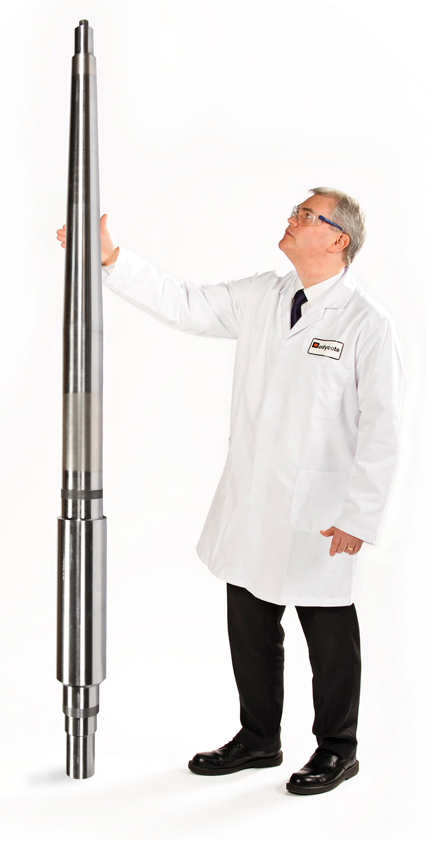
As a group, Bodycote is committed to acting responsibly as a good corporate citizen, to reducing the environmental impact of the Group's activities and to providing our employees with a safe working environment.
Bodycote's stakeholder model shows how its interactions on various levels contribute towards socioeconomic growth and development. These exchanges, based on mutually beneficial relationships, provide the basis for the company's growth and sustainability, which in return provides benefits to employees, investors, suppliers, customers, the public sector and the wider society.
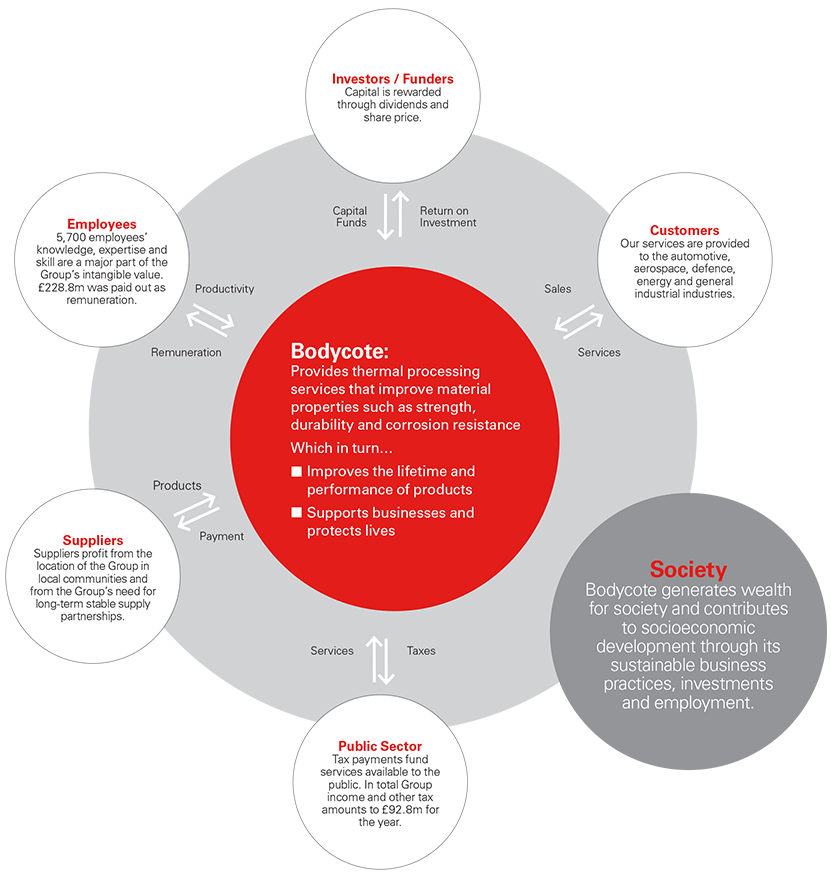
Accident frequency1
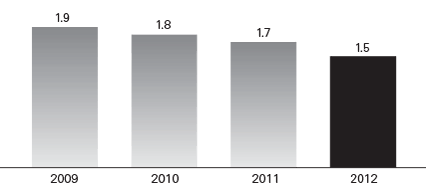
Carbon footprint2
(tonne CO2e/£m sales)
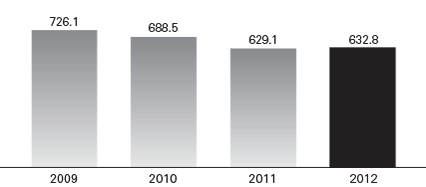
Water consumption
(thousand m³/£m sales)
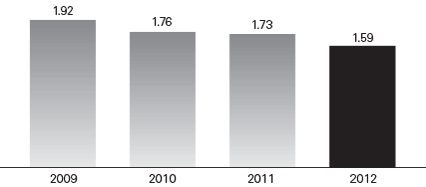
Chlorinated solvents
(kg/£m sales)
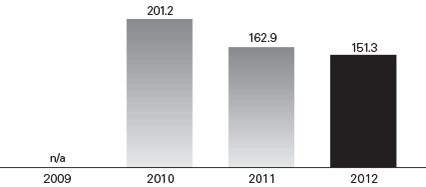
ISO 14001 accredited facilities
(%)
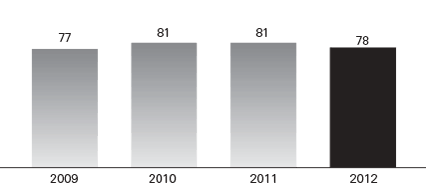
- The accident rate for 2011 includes data for some regions that were previously not reported. Accident frequency is defined as the number of lost time accidents per 200,000 hours worked.
- CO2e is carbon dioxide equivalent, which represents the CO2 released due to our energy usage.
Our approach
Bodycote's objective is to create superior shareholder returns through the provision of selected thermal processing services that are highly valued by our customers and to achieve this in a safe working environment, while continually seeking to minimise the impact on the environment.
Bodycote is dedicated to improving management of corporate responsibility issues and is implementing policies and initiatives to achieve this goal. The future success and growth of the Group is intrinsically linked to our ability to ensure the Group's operations are sustainable and that we can nurture and develop our talent.
Our people
The strength of the Group primarily rests in its people and one of the key challenges for management is to ensure availability of appropriately qualified people to support its continued growth. Bodycote is fortunate to have a competent and committed international team that is well-respected in technical and business circles.
Bodycote invests in the training and development of its people both at local and Group level. At a local level the Company is committed to providing the appropriate skills and technical training which will allow its employees to operate effectively and safely in their roles and deliver excellent customer service. At Group level a number of initiatives are currently being rolled out to drive excellence in management.
A tool to develop further understanding and skill in the area of performance management has been built and has been cascaded globally through the management population. Through communication of clear messages coupled with skills development, the organisation aims to raise the capability of its management population in driving performance. This initiative is backed by a performance management IS system which supports the process.
Bodycote's employment policies are non-discriminatory, complying with all current legislation to engender equal opportunity irrespective of race, gender, religion, disability, sexual orientation or nationality. Harassment is not tolerated.
Human rights
Bodycote's human rights policy is consistent with the Universal Declaration of Human Rights and the UN Global Compact's ten principles.
We prohibit forced, compulsory and underage labour and any form of discrimination based on race, gender, religion, age, disability or political affiliation. Appropriate mechanisms are in place to support any contraventions of these rules.
Customers and suppliers
Bodycote has no significant suppliers who are wholly dependent upon the Group's business. Suppliers are paid in line with contractual and legal obligations.
We endeavour to respond quickly to changing customer demand, to identify emerging needs and to improve service availability and quality. We stay close to our current and potential customers, building long-term relationships.
Bodycote seeks to play a positive role in the local communities in which it operates by providing employment opportunities, building goodwill and developing a reputation as a good neighbour and employer.
Responsible business ethics
All Bodycote personnel are expected to apply a high ethical standard, consistent with an international UK-listed company. Directors and employees are expected to ensure that their personal interests do not at any time conflict with those of Bodycote. Shareholder employees are advised of and comply with share dealing codes.
Bodycote has systems in place designed to ensure compliance with all applicable laws and regulations and conformity with all relevant codes of business practice. Furthermore, Bodycote does not make political donations.
With regard to competition, Bodycote aims to win business in a differentiated high-value manner. The Group does not employ unfair trading methods and it competes vigorously but fairly within the requirements of the applicable laws. Employees are prohibited from either giving or receiving any inducements.
Our Open Door Policy has been translated into all languages used throughout the Group. The policy allows employees to report their concern orally or in writing and in confidence to an independent third party provider to ensure anonymity. Reports are transcribed and sent to the Vice President of Risk, who then passes the matter to the appropriate individual in the business to address.
Bribery and Competition Law online training courses have been put in place, translated into the major languages used throughout the Group, and relevant employees have completed the interactive courses.
Operational SHE performance
Bodycote is committed to building and maintaining a high reliability organisation; one that delivers consistently high performance across all aspects of safety, health and environmental (SHE) management. Its objective is to be known for the excellence of its SHE performance in all of its business activities and at all of its sites.
Safety and health
The nature of the Group's operations is such that employees are potentially exposed to hazards in the workplace. Bodycote aims to manage these hazards and thereby minimise risks to employees through the deployment of a robust safety management system which includes appropriate policies and procedures.
Although Bodycote has reduced its lost-time accident rate by 35% over the past five years, it recognises the need to improve further. Starting in 2012, a three-year global improvement strategy has been initiated, which focuses on all aspects of the safety management system, whilst developing cultural maturity. An important element of this is the role of leadership, including the active engagement of managers at all levels in managing safety, but recognising that all employees have responsibilities for their own safety and the safety of others. In keeping with this, a group-wide employee 'safety climate' survey was undertaken in 2012, to which 41% of all employees responded. A number of specific improvement actions have been taken to address some of the concerns raised by the survey.
KPI – accident frequency (lost-time injury rate)
Accident frequency is defined as the number of lost time accidents per 200,000 hours worked.
Environment
A proactive approach to improving energy efficiency means that Bodycote has implemented a variety of systems to reduce water and gas consumption and re-use energy. The continuing focus on lessening its impact on the environment has resulted in Bodycote advancing towards ISO 14001 accreditation at all of its facilities, with most of the Group having already achieved this standard.
At every stage where Bodycote is involved in the manufacturing cycle, our operational aim is to reduce the overall impact on the environment, not just in our own operations, but also those of our customers. Bodycote operates modern, efficient equipment, which is operated around the clock so as to optimise thermal processing cycles. Without Bodycote, many companies would be using older technology in-house and running their equipment at reduced capacity, both of which are a drain on energy resources. Working with Bodycote enables our customers to commit more easily to carbon reduction initiatives.
Bodycote also reduces the carbon footprint of its customers' activities by increasing the lifespan of their products, by improving metallurgical properties and by enhancing corrosion resistance. For example, surface treatment technology is widely used in the reclamation of damaged and worn components, offering a cost-effective and energy-efficient alternative to the need to manufacture new replacement parts, and treated parts often last up to twenty times longer than the original.
So, whilst thermal processing is an energy-intensive business, it is a vital part of the manufacturing chain and its use saves the energy it consumes many times over.
ISO 14001 accredited facilities
Reducing the environmental impact of the Group's activities is taken very seriously. Compliance with the requirements of ISO 14001 helps to minimise the risk of adverse environmental effects at Bodycote's locations. At the end of 2012, the Group had 193 locations and 78% of our operating facilities had achieved ISO 14001 accreditation. The decrease in the percentage compared to prior years is due to facilities acquired which have not yet obtained accreditation. Excluding acquisitions, 86% of our facilities had achieved ISO 14001 accreditation.
KPI – Carbon footprint and water consumption
As a consequence of the increase in sales, and the acquisition of a number of new operational sites, the absolute electricity usage increased by 2% whilst gas usage increased by 14.4% - together accounting for an increase in energy usage of 8.8%. The total Group energy use excluding these acquisitions remained constant compared with 2011.
Excluding acquisitions the carbon footprint decreased by 3.5% from 629.1 tonnes per £m sales to 606.9 tonnes per £m sales. Including acquisitions the carbon footprint increased by 0.6% to 632.8 tonnes per £m of sales.
Water usage per £m sales decreased by 8%. The Group's total CO2 emission data is based on Scope 1 and Scope 2 emissions, as defined by the UK Government's Department for Environment, Food and Rural Affairs, and data relating to this has been calculated to include country-specific electricity conversion factors.
Chlorinated solvent use
The use of chlorinated solvents in Bodycote's thermal processing activities has been reduced in recent years as aqueous degreasing equipment has been introduced. In 2012 the overall solvent use decreased by 7% compared with the previous year.
A greener, cleaner environment
Reducing any detrimental impact on the environment has become a growing focus of industry worldwide and Bodycote can assist in the drive towards carbon reduction and environmentally friendly approaches in a number of ways.
For example, certain heat treatment and thermally sprayed surface treatments are leading the way in the replacement of older, less environmentally friendly processes such as chrome plating.
Future restrictions that will be placed on chrome plating due to health and environmental issues have led many businesses, including the major aerospace companies, to embark on initiatives to replace it. These companies have highlighted thermal spray coatings as the preferred replacement for chrome plating.
Bodycote has been involved in a number of initiatives to replace chrome plate and results have shown that, in addition to the environmental benefits, thermally sprayed tungsten carbide outperforms hard chrome plate for both wear and corrosion protection.
Modern thermal processing techniques have allowed designers and manufacturers to use much lighter materials, such as aluminium and titanium, and have significantly prolonged component lifetimes. Through the effective use of thermal processing, parts can now be lighter and overall component weight reduced, leading to improved efficiency and reduced fuel consumption of products in service.
